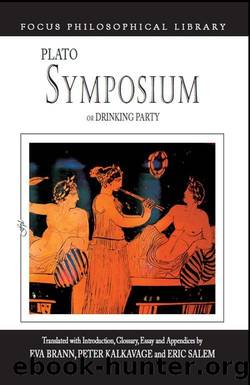Symposium or Drinking Party (Focus Philosophical Library) by Plato

Author:Plato [Plato]
Language: eng
Format: epub
ISBN: 9781585108558
Publisher: Hackett Publishing Company, Inc.
Published: 2017-02-14T05:00:00+00:00
A Comic Arrival
A funny thing happens when Aristodemus arrives at Agathonâs house. The door is wide openâlike Agathonâs spirit of easygoing hospitality. A household slave brings him directly to the dining room, where all the guests are reclining on couches. Agathon warmly invites Aristodemus (âBest Demos or Peopleâ) to join them, explains (not very convincingly) why he didnât invite him yesterday, and asks why heâs not bringing his master. Then comes the funny part: Aristodemus wheels around, thinking that Socrates is right behind him, and realizesâheâs not there! A flustered Aristodemus then explains that heâs not the one who was bringing Socrates: itâs the other way around.91
The comedy of arrival continues when a servant reports that the eccentric Socrates is standing in the neighborâs porch and not responding when called. Agathon wants to compel Socrates to come in, but Aristodemus stops him, explaining that for Socrates this is normal behavior (175B). The explanation points to a major theme in the Symposium: the odd ways of the philosopher, who sometimes unaccountably stops to think and seems to go off into his own world.92 This is indeed a cause for wonder. But itâs also a reproach to mere mortals, especially ambitious ones {65} like Alcibiades, who are bent on moving forward with no thought about where theyâre going.
In his own good time, Socrates arrives. Agathon invites him to lie down by him, so that the âwise thingâ Socrates gained on the porch might flow into him through physical contact. If only it were that easy, says Socrates. If only wisdom flowed like water from the fuller into the emptier. But it doesnât work like that: wisdom isnât a fluid body, and all the touching in the world wonât make anybody wise. If wisdom did flow, then Socrates would be the one who benefited from the wisdom Agathon showed when his poetic speech revealed itself gloriously in the theater of Dionysus. Agathon picks up on the sarcasm (apparently heâs used to it) and calls Socrates a hybristês, an âinsolent mockerâ (175E). He playfully keeps up the quarrel between poetry and philosophy with a juridical image: later Socrates and Agathon will plead their case about whoâs the wiser, with the wine-god Dionysus as judge.93
A Sober Doctor Prescribes an Erotic Theme
After the banter between philosopher and poet (thereâs a lot of banter in the Symposium), the company finishes dinner. Libations are poured and all the other customary things observed, including a chant to the god. Then they turn to what is supposed to happen at a symposiumâheavy drinking (176A). At this point in Platoâs drama we meet, one by one, the characters (other than Socrates and Agathon) who will praise Eros: first Pausanias, then Aristophanes, Eryximachus and Phaedrus.
Pausanias is the first to counsel moderation. Since theyâre horribly hungover from yesterdayâs binge, he urges that they ease up on the drinking. Aristophanes heartily agrees. The exchange highlights the companyâs not-so-virtuous reason for being moderate: avoidance of pain brought on by recent self-indulgence. Itâs a bodily reason suited to a doctorâs view of life.
Download
This site does not store any files on its server. We only index and link to content provided by other sites. Please contact the content providers to delete copyright contents if any and email us, we'll remove relevant links or contents immediately.
The remains of the day by Kazuo Ishiguro(7551)
Tools of Titans by Timothy Ferriss(6949)
The Black Swan by Nassim Nicholas Taleb(6192)
Inner Engineering: A Yogi's Guide to Joy by Sadhguru(5897)
Giovanni's Room by James Baldwin(5879)
The Way of Zen by Alan W. Watts(5800)
The Six Wives Of Henry VIII (WOMEN IN HISTORY) by Fraser Antonia(4791)
The Power of Now: A Guide to Spiritual Enlightenment by Eckhart Tolle(4756)
Astrophysics for People in a Hurry by Neil DeGrasse Tyson(4620)
Asking the Right Questions: A Guide to Critical Thinking by M. Neil Browne & Stuart M. Keeley(4576)
12 Rules for Life by Jordan B. Peterson(3734)
The Ethical Slut by Janet W. Hardy(3504)
Skin in the Game by Nassim Nicholas Taleb(3462)
Housekeeping by Marilynne Robinson(3402)
The Art of Happiness by The Dalai Lama(3385)
Double Down (Diary of a Wimpy Kid Book 11) by Jeff Kinney(3274)
Skin in the Game: Hidden Asymmetries in Daily Life by Nassim Nicholas Taleb(3264)
Walking by Henry David Thoreau(3234)
12 Rules for Life: An Antidote to Chaos by Jordan B. Peterson(3204)
